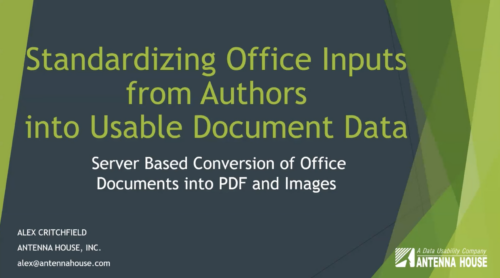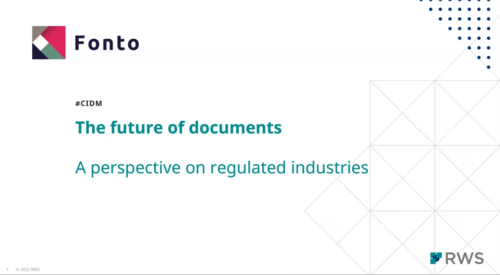Recorded on: August 21, 2024

Uncover the various ways to use a RAG solution with PoolParty and GraphDB
We’re familiar with RAG - but which RAG is the right fit?
As organizations increasingly rely on AI-driven information retrieval and generation, traditional Retrieval Augmented Generation (RAG) systems often fall short in production environments. Various solutions have emerged to address this challenge, recognizing that “one size does not fit all” - each organization has unique requirements to tackle this issue within their framework.
Increase efficiency by up to 20% with Semantic RAG (AKA Graph RAG)
This webinar explores an innovative solution: Semantic RAG, which harnesses the power of knowledge graphs, large language models (LLMs), and graph databases to enhance semantic retrieval and generation capabilities.
A key focus will be on LLM-derived knowledge graphs, demonstrating how they can be created and refined with human-in-the-loop processes to achieve greater accuracy and explainability. We'll explore memory constructs in Graph RAG operations, illustrated through practical demonstrations using PoolParty and GraphDB.
We will dive into a real-world case study and explore the pipeline, architecture, and practical applications of Semantic RAG systems. This will showcase valuable insights into the seamless collaboration between PoolParty and GraphDB to deliver a robust Semantic RAG solution. Expert strategies will be shared for maximizing the impact of these innovative technologies by shortening time to insight, providing savvy querying for the untrained, and lowering long term maintenance costs.
Márcia Ferreira, Data and Knowledge Engineer (Technical Consultant) at Semantic Web Company, and Krasimira Bozhonova, Solutions Architect at Ontotext, will walk you through the following aspects and explain the benefits of a Semantic RAG approach:
-
Vector RAG vs. Graph RAG
-
Grounding LLMs with Graph
-
Conventional RAG vs. Semantic RAG
-
Different varieties of Graph RAG
-
Demo of PoolParty Semantic RAG and GraphDB
In the meantime, have a look at our Semantic Retrieval Augmented Generation page to learn more about the capabilities and benefits of utilizing Knowledge Graphs to power your Generative AI experience.
We hope to see you there!
Presented by:
Márcia Ferreira, Semantic Web Company

Márcia R. Ferreira is a Data and Knowledge Engineer (Technical Consultant) at Semantic Web Company. By implementing state-of-the-art semantic systems, Márcia ensures customers' data requirements are met at the highest level. She is interested in integrating LLMs with graph technologies for impactful applications in knowledge-intensive industries.
Krasimira Bozhanova, Ontotext

Krasimira Bozhanova is a Solutions Architect at Ontotext, starting her way as a developer and contributing to many of the company's significant client projects. In recent years she has been a part of the AI in Action Ontotext initiative which puts Ontotext products at the heart of various AI applications.
 When should regression testing be performed?
Regression analysis of PDFs allows you to test system changes, changes to CMS, changes to stylesheet, changes to formatting software, and changes to graphic software.
Regression testing should take place anytime your system, hardware, or software changes to determine if what was correct in the output is still correct in output. Changes may result in content disappearing, incorrect formatting, changes to the integrity of images and tables, and many other (sometimes subtle) issues that invalidate the reliability of the document.
Antenna House Regression Testing System is for Automated – Fast – Accurate PDF to PDF & Image to Image Visual Comparisons
When should regression testing be performed?
Regression analysis of PDFs allows you to test system changes, changes to CMS, changes to stylesheet, changes to formatting software, and changes to graphic software.
Regression testing should take place anytime your system, hardware, or software changes to determine if what was correct in the output is still correct in output. Changes may result in content disappearing, incorrect formatting, changes to the integrity of images and tables, and many other (sometimes subtle) issues that invalidate the reliability of the document.
Antenna House Regression Testing System is for Automated – Fast – Accurate PDF to PDF & Image to Image Visual Comparisons



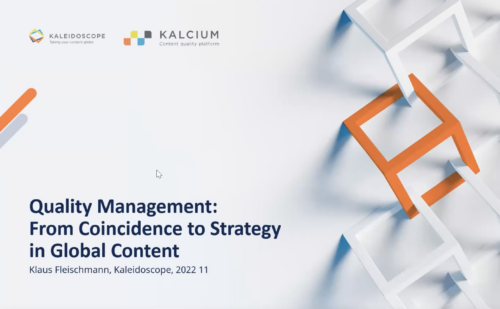

 Klaus Fleischmann studied translation and IT in Vienna, holds an MA in Conference Interpreting from Monterey, California, and a MAS in Technical Communication from Krems, Austria. In 1996, he founded Austria-based Kaleidoscope, a company implementing content, translation, and terminology management processes for internationally active companies. Kaleidoscope develops online collaboration software for enterprise-level terminology workflow, translator query management, in-country review etc., making the translation quality process comprehensible and strategically manageable. In 2007, he became CEO of Austria´s leading LSP, Eurocom Translation Services. Always active in the industry, Klaus got voted into the Gala Board of Directors in 2015 and 2017.
Klaus Fleischmann studied translation and IT in Vienna, holds an MA in Conference Interpreting from Monterey, California, and a MAS in Technical Communication from Krems, Austria. In 1996, he founded Austria-based Kaleidoscope, a company implementing content, translation, and terminology management processes for internationally active companies. Kaleidoscope develops online collaboration software for enterprise-level terminology workflow, translator query management, in-country review etc., making the translation quality process comprehensible and strategically manageable. In 2007, he became CEO of Austria´s leading LSP, Eurocom Translation Services. Always active in the industry, Klaus got voted into the Gala Board of Directors in 2015 and 2017. 

 Tristan is Product Director at DeltaXML, a technology company with world-leading software products for the management of change in structured content. He has a deep understanding of DeltaXML’s product suite and loves to help customers create extra value in their content using change management. Tristan is a father to three daughters, a movie lover, and a keen runner.
Tristan is Product Director at DeltaXML, a technology company with world-leading software products for the management of change in structured content. He has a deep understanding of DeltaXML’s product suite and loves to help customers create extra value in their content using change management. Tristan is a father to three daughters, a movie lover, and a keen runner.


 Dipo Ajose-Coker, RWS
Dipo Ajose-Coker, Senior Product Marketing Manager for RWS Tridion Docs, brings over 18 years of experience in structured content, technical communications, and product marketing. After relocating to France in 2005 and obtaining his MA in Multilingual and Multimedia Document Conception from Université Paris Cité, Dipo built a career spanning technical writing, editing, DITA migration, and strategic content development within MedTech and Fintech industries.
In 2021, he shifted focus to Product Marketing, acting as the vital intermediary between technical teams and end-users. Dipo excels at translating complex technical features into clear, compelling messages that resonate across all business levels. Known for his practical approach and ability to unite diverse perspectives, he drives effective content strategies and fosters strong communication between developers, users, and industry stakeholders. Today, Dipo continues to lead strategic initiatives at RWS, empowering organizations to achieve clarity, compliance, and growth through intelligent content solutions.
Feel free to connect with and follow Dipo on LinkedIn: https://www.linkedin.com/in/dipocoker/. Email:
Dipo Ajose-Coker, RWS
Dipo Ajose-Coker, Senior Product Marketing Manager for RWS Tridion Docs, brings over 18 years of experience in structured content, technical communications, and product marketing. After relocating to France in 2005 and obtaining his MA in Multilingual and Multimedia Document Conception from Université Paris Cité, Dipo built a career spanning technical writing, editing, DITA migration, and strategic content development within MedTech and Fintech industries.
In 2021, he shifted focus to Product Marketing, acting as the vital intermediary between technical teams and end-users. Dipo excels at translating complex technical features into clear, compelling messages that resonate across all business levels. Known for his practical approach and ability to unite diverse perspectives, he drives effective content strategies and fosters strong communication between developers, users, and industry stakeholders. Today, Dipo continues to lead strategic initiatives at RWS, empowering organizations to achieve clarity, compliance, and growth through intelligent content solutions.
Feel free to connect with and follow Dipo on LinkedIn: https://www.linkedin.com/in/dipocoker/. Email:  Sarah O'Keefe, Scriptorium
Sarah O’Keefe is the founder and CEO of Scriptorium. Driven by learning and exploration, she takes pride in providing a meaningful contribution to the world of customer-facing content and beyond. As a pioneer in the content industry, she is a globally recognized author and speaker.
Sarah O'Keefe, Scriptorium
Sarah O’Keefe is the founder and CEO of Scriptorium. Driven by learning and exploration, she takes pride in providing a meaningful contribution to the world of customer-facing content and beyond. As a pioneer in the content industry, she is a globally recognized author and speaker.
 Marianne Calilhanna, DCL
Marianne is a content and technology professional with 30+ years of marketing, editorial, product development, publishing, and change management experience. Marianne manages Data Conversion Laboratory’s marketing activities, which comprises sharing the company’s success stories in a way that is meaningful to the industries DCL serves. She publishes the monthly DCL newsletter, develops content for and produces the DCL Learning Series, exhibits and sponsors industry events, manages the corporate website, and takes part in transforming DCL’s broad list of services into pragmatic products that support content structure and content interchange.
Marianne Calilhanna, DCL
Marianne is a content and technology professional with 30+ years of marketing, editorial, product development, publishing, and change management experience. Marianne manages Data Conversion Laboratory’s marketing activities, which comprises sharing the company’s success stories in a way that is meaningful to the industries DCL serves. She publishes the monthly DCL newsletter, develops content for and produces the DCL Learning Series, exhibits and sponsors industry events, manages the corporate website, and takes part in transforming DCL’s broad list of services into pragmatic products that support content structure and content interchange.
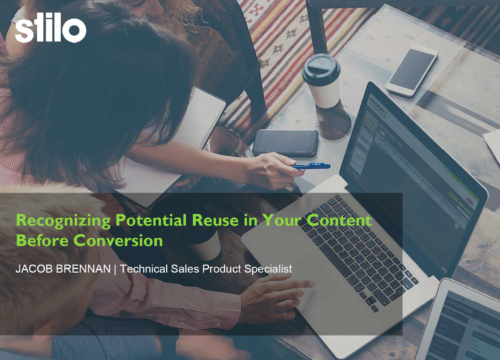

 Jacob Brennan is a Technical Sales Product Specialist at Stilo. He works with Stilo Migrate customers and aids in converting their legacy content to DITA. Jacob is a recent graduate from the University of Ottawa holding a BASc. in Mechanical Engineering and a BSc. in Computing Technology.
Jacob Brennan is a Technical Sales Product Specialist at Stilo. He works with Stilo Migrate customers and aids in converting their legacy content to DITA. Jacob is a recent graduate from the University of Ottawa holding a BASc. in Mechanical Engineering and a BSc. in Computing Technology. 



 Fabrice Lacroix is a serial entrepreneur and a technology pioneer. He has been working for 25 years on the development of innovative solutions around search technology, content enrichment and AI. He is the founder of Fluid Topics, the leading Content Delivery Platform that reinvents how users search, read and interact with technical documentation.
Fabrice Lacroix is a serial entrepreneur and a technology pioneer. He has been working for 25 years on the development of innovative solutions around search technology, content enrichment and AI. He is the founder of Fluid Topics, the leading Content Delivery Platform that reinvents how users search, read and interact with technical documentation. 

 Márcia R. Ferreira is a Data and Knowledge Engineer (Technical Consultant) at Semantic Web Company. By implementing state-of-the-art semantic systems, Márcia ensures customers' data requirements are met at the highest level. She is interested in integrating LLMs with graph technologies for impactful applications in knowledge-intensive industries.
Krasimira Bozhanova, Ontotext
Márcia R. Ferreira is a Data and Knowledge Engineer (Technical Consultant) at Semantic Web Company. By implementing state-of-the-art semantic systems, Márcia ensures customers' data requirements are met at the highest level. She is interested in integrating LLMs with graph technologies for impactful applications in knowledge-intensive industries.
Krasimira Bozhanova, Ontotext
 Krasimira Bozhanova is a Solutions Architect at Ontotext, starting her way as a developer and contributing to many of the company's significant client projects. In recent years she has been a part of the AI in Action Ontotext initiative which puts Ontotext products at the heart of various AI applications.
Krasimira Bozhanova is a Solutions Architect at Ontotext, starting her way as a developer and contributing to many of the company's significant client projects. In recent years she has been a part of the AI in Action Ontotext initiative which puts Ontotext products at the heart of various AI applications. 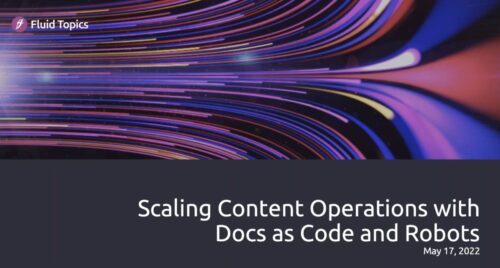
 While product cycles are getting shorter in all industries, down to daily releases for SaaS vendors, technical documentation teams have to keep up with the pace. Information needs to be written faster and delivered in sync.
Join Fabrice Lacroix, CEO and founder of Fluid Topics, and Gaspard Bébié-Valérian, certified technical writer and functional consultant, as they untangle the complex process of continuous content delivery and unveil new methods and processes to embrace the new landscape of documentation. They will share their insights and experience as they explore the collaborative potential between SMEs and tech writers opened by Docs as Code, examine the tooling behind a continuous documentation flow, and showcase the example of a robot writing release notes.
Presented by Fabrice Lacroix & Gaspard Bébié-Valérian:
Fabrice Lacroix is a serial entrepreneur and a technology pioneer. He has been working for 25 years on the development of innovative solutions around search technology, content enrichment and AI. He is the founder of Fluid Topics, the leading Content Delivery Platform that reinvents how users search, read and interact with technical documentation.
At the crossroads of engineering and social sciences, Gaspard enjoys exploring the breadth of technologies involved in technical documentation, including structured documentation, CCMS, and collaborative paradigms like docs as code. Gaspard works as Functional Consultant at Antidot helping clients get the most out of Fluid Topics.
While product cycles are getting shorter in all industries, down to daily releases for SaaS vendors, technical documentation teams have to keep up with the pace. Information needs to be written faster and delivered in sync.
Join Fabrice Lacroix, CEO and founder of Fluid Topics, and Gaspard Bébié-Valérian, certified technical writer and functional consultant, as they untangle the complex process of continuous content delivery and unveil new methods and processes to embrace the new landscape of documentation. They will share their insights and experience as they explore the collaborative potential between SMEs and tech writers opened by Docs as Code, examine the tooling behind a continuous documentation flow, and showcase the example of a robot writing release notes.
Presented by Fabrice Lacroix & Gaspard Bébié-Valérian:
Fabrice Lacroix is a serial entrepreneur and a technology pioneer. He has been working for 25 years on the development of innovative solutions around search technology, content enrichment and AI. He is the founder of Fluid Topics, the leading Content Delivery Platform that reinvents how users search, read and interact with technical documentation.
At the crossroads of engineering and social sciences, Gaspard enjoys exploring the breadth of technologies involved in technical documentation, including structured documentation, CCMS, and collaborative paradigms like docs as code. Gaspard works as Functional Consultant at Antidot helping clients get the most out of Fluid Topics. 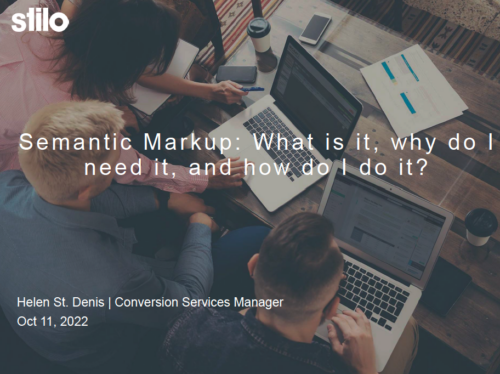
 Helen joined Stilo as a technical editor. She now works closely with Stilo Migrate customers, helping them to analyze their legacy content and configure appropriate mapping rules. She also provides Migrate customer training and support. Helen has helped Migrate customers to convert millions of pages of content to DITA and custom XML. Helen holds a Bachelor of Arts in English from St. Francis Xavier University in Antigonish, Nova Scotia, and has pursued graduate studies at Queen’s University in Kingston, Ontario. Email:
Helen joined Stilo as a technical editor. She now works closely with Stilo Migrate customers, helping them to analyze their legacy content and configure appropriate mapping rules. She also provides Migrate customer training and support. Helen has helped Migrate customers to convert millions of pages of content to DITA and custom XML. Helen holds a Bachelor of Arts in English from St. Francis Xavier University in Antigonish, Nova Scotia, and has pursued graduate studies at Queen’s University in Kingston, Ontario. Email: 